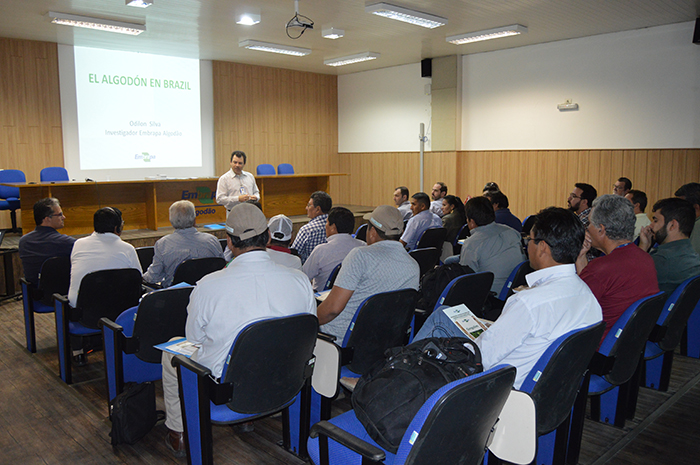Bolivian mission learns about Brazilian experiences in cotton production
Bolivian mission learns about Brazilian experiences in cotton production
Photo: Alexandre Oliveira

At their visit to Embrapa, the Bolivians were welcomed by the general head Liv Severino, who presented the center's main lines of research
Representatives of the government, technicians and family farmers from Bolivia who work in the cotton production chain on the last 27 started a visit to Brazil to learn about the country's experience in the cotton sector. For nine days, a group of 22 people will visit Paraíba and Brasília to learn experiences in the areas of public policy, sustainable cotton systems, agroecological production, colored cotton production, farmers' associations and state trade.
The technical visit to Brazil is part of the Trilateral South-South Cooperation Project +Cotton Project, carried out by the Brazilian government, through the Brazilian Cooperation Agency (ABC/MRE), FAO and seven partner countries, which include the government of Bolivia. Under implementation since 2013, the aim is to contribute to the sustainable development of the cotton value chain in partner countries, and broaden capacity for interinstitutional coordination to strengthen the sector.
In the first day of the mission, the group was received by the governor of Paraíba state, Ricardo Coutinho, and visited the textile industry Norfil, in João Pessoa, the capital. On the following day, the Bolivian delegation visited two production enterprises in Catolé de Boa Vista and learned a little more about the technical assistance and rural extension policies developed by Paraíba's Technical Assistance and Rural Extension Corporation (Emater-PB) and the headquarters of Embrapa Cotton (Campina Grande, PB).
At their visit to Embrapa, the Bolivians were welcomed by the general head Liv Severino, who presented the center's main lines of research. They were also able to interact with crop researchers and learn about cotton production systems for the Brazilian Cerrado and Semiarid regions. The group also saw the fibre laboratory and a demonstration of the cotton gin and mini-harvester.
The departmental project coordinator of + Cotton in Bolivia, Rosendo Mendoza, recalls that in the 1990s Bolivia was able to produce 90,000 hectares of cotton, but there was a drastic fall due to the international prices of the fiber becoming less competitive than Bolivian cotton. “In 2017 around 2,000 hectares were cultivated by about 25 growers”, he reports. “The technology that our farmers use is not much up-to-date because since 2004 there has not been more investment in cotton research. Our farmers copy technology from other countries, but the technology is not validated for local conditions. During this visit, we want to learn about the technology that Embrapa has developed for smallholders and mid-sized farmers”, he adds.
The agenda in Paraíba also included visits to organic cotton producing propertiesat the Margarida Alves Settlement, in Juarez Távora, where the group will learn about processing and fairtrade processes, and to CoopNatural, a cooperative that processes organic naturally colored cotton produced in the state.
From September 2 to September 4, the second part of the mission will take place in Brasília, DF, with the participation in a series of activities like a roundtable with the Solidarity Economy Forum of Distrito Federal and outskirts, and visits to an agricultural property, to Embrapa Genetic Resources and Biotechnology, and to the Brazilian Association of Cotton Producers (Abrapa), among others.
South-South Cooperation to strengthen the sector
The project +Cotton, executed in the scope of the Brazil-FAO International Cooperation Program, also offers the possibility of progressing to differentiated markets and niches that could allow adding value and generating income for families.
The Brazilian experience in cotton production is a reference for the project, since the country moved on from the status of importer to becoming a large cotton exporter due to the large increase in productivity. Brazil has made significant investments in agricultural research, which promoted the development of technologies that are adapted to the new agricultural frontiers. Moreover, the country is a reference in public policy for family farming, which has drawn the interest of other countries in Latin America.
Bolivia, as well as Argentina, Colombia, Ecuador, Haiti, Paraguay and Peru are strategic partners in this cooperation project.
More cotton in Bolivia
In Bolivia, the project +Cotton is based in the town of Pailón, which contributes with 70% of the country's cotton production, and the towns with indigenous populations Charagua, Gutiérrez and San Antonio de Lomerío. In such territory, the project has developed actities to strengthen technical, productive, managerial and liaison capacities to reactivate the cotton production system based on sustainable development and sustainable community economy.
Participants in the +Cotton project in Bolivia include their Ministry of Rural Development and Lands, and Ministry of Productive Development and Plural Economy; FAO and ABC/MRE; and the cooperating Brazilian institutions: Emater-PB and the National Secretariat for Solidarity Economy from the Ministry of Labor (Senaes/MT)
With information from FAO
Translation: Mariana Medeiros
Edna Santos (MTB-CE 01700)
Embrapa Cotton
Press inquiries
algodao.imprensa@embrapa.br
Phone number: +55 83 3182-4361
Further information on the topic
Citizen Attention Service (SAC)
www.embrapa.br/contact-us/sac/
